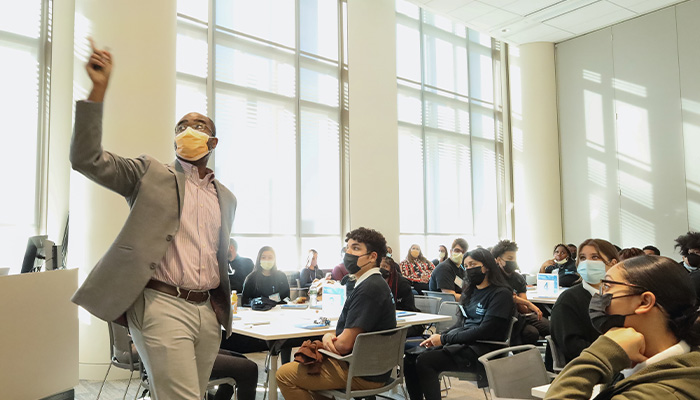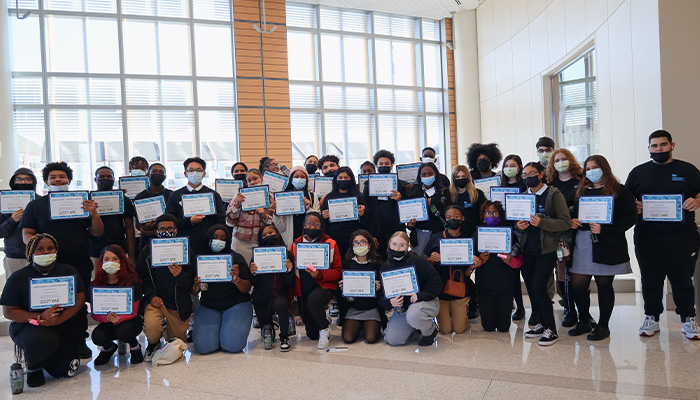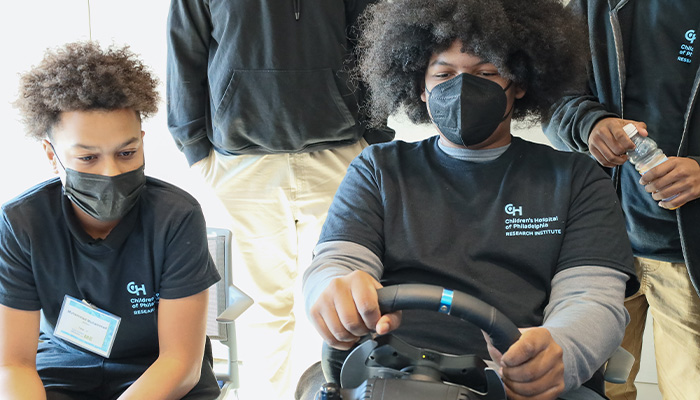HOW CAN WE HELP YOU? Call 1-800-TRY-CHOP
In This Section
For High School Students, Everything is Possible at Discovery Day

Students leaned into science at this year's Discovery Day.
limjr [at] chop.edu (By Jillian Rose Lim)
Fifteen-year-old Michael Hawkins can easily name his favorite part of this year's Discovery Day: It was the moment when he, along with 10th-grade students from three other local high schools, spoke one-on-one with Children's Hospital of Philadelphia professionals in various science and research fields.
"Both the psychologist [Alfonso Floyd, PhD] and the radiographer [Shanai Harris, RT (R) (ARRT)] we met were from our community," said Hawkins, a student at Dr. Charles E. Brimm Medical Arts High School in Camden, New Jersey. "It inspired me to meet people just like us - if they can do it, I can do it too."
Hawkins' takeaway encapsulates what Discovery Day, held at the Roberts Center for Pediatric Research Nov. 14, set out to offer: an opportunity for students from under-resourced schools and diverse backgrounds to glimpse the possibilities and promise of a career in Science, Technology, Engineering, Math, and Medicine (STEM-M).
Discovery Day is the brainchild of Senior Outreach Programs Officer Michelle Marshall, and her colleagues in the Office of Academic Training and Outreach Programs (ATOP) at CHOP. Since its inception in 2016, the day-long, activity-packed event has been held both in-person and virtually with participation from faculty and staff from across the Research Institute.
"Programs like Discovery Day give students an opportunity to imagine, reflect, and build curiosity in the spirit of discovery," Marshall said. "Through this level of exposure, whether understanding why science is important in their lives, learning different career paths, or experiencing firsthand how innovation improves the health and wellness of children across the globe, these 35 enthusiastic students were a part of an exploration of oneself in the world of science and medicine. The key takeaway? If they can dream it, the possibilities are here at Children's Hospital of Philadelphia."
Marshall and her team designed a full agenda that began bright and early with students from Brimm Medical Arts, Saint Neumann Goretti, Penn Treaty, and Hardy Williams high schools, bustling in for a crash course on the significance of science.
Why Science Matters

Tenth-grade students from four high schools attended the event at the Roberts Center for Pediatric Research.
George Dalembert, MD, attending physician in Pediatrics and a faculty scholar in PolicyLab at CHOP, introduced the students to the importance of curiosity. He encouraged the group to "wonder" more about the world around them.
Wendy Reed Williams, PhD, senior director of ATOP, then invited the students to write their own personal "science story," a summary of the different ways in which science might show up in their lives, from personal interests to family stories to career aspirations.
Damian Irizarry, 15, a student at Brimm Medical Arts, wrote about an interest in genetics and family medical history, while Quenyae Davis, 15, of Hardy Williams, included her fascination with psychology and the human mind and body. Through these stories, Dr. Reed Williams said, we see how intertwined scientific research is in our everyday world.
After playing a classic game of "Heads Up" that featured words related to science and research, the students settled in for a keynote speech from Wanjiku F.M. Ngoroje, MD, psychiatrist and investigator in the Department of Child and Adolescent Psychiatry and Behavioral Sciences at CHOP. Dr. Ngoroje's research focuses on identifying and promoting early interventions to optimize health outcomes for infants and families from vulnerable and disenfranchised populations.
Support in Science and Seeing the Possibilities
Dr. Njoroge described her career path that began at Columbia University, where she received her bachelor's degree, to the Baylor College of Medicine, the University of Pennsylvania, and Yale University, and finally, to where she is today: the founder and medical director of the Young Child Clinic at CHOP. Dr. Njoroge's speech highlighted the importance of finding and participating in support networks such as those she found at Baylor and Yale in the days when campuses were first beginning to see more diverse classes of students.
Dr. Njoroge also spoke about the different specialties she sampled before deciding on her chosen career path: first, she wanted to be an OB-GYN, then a psychiatrist, then a surgeon, and finally, a physician-researcher focused on improving practice and policy.
"As a high school sophomore, I never imagined the career that I would have now," Dr. Njoroge said. "I certainly didn't think I'd have a research lab and a whole team of people doing pediatric psychiatric research and policy work. But experiences lead you to different pathways, your support network helps you, and your career path can change. The course you take will alter over time as you meet people, learn new things, and have experiences. It's not a one-step path."
For many of the students, including Damian Irizarry, Dr. Njoroge's speech was the highlight of the day.
"My favorite part was listening to [Dr. Njoroge] talk about her whole journey because it gave me the idea that I don't have to pick something right now; I can always change my options," Irizarry said. "And I can go to any amount of schooling and choose all different types of options and still get to where I want to be, like starting new clinics and things that have not been made yet."
In addition to Dr. Njoroge's keynote, the students also heard life stories from a variety of CHOP professionals during a Career Speed Forum. The students spoke one-on-one with genetic counselor Sara Ruggiero, MS, LCGC; art therapist Mikayla Voller, MA; psychologist Alfonso Floyd, PhD; radiographer Shanai Harris, RT (R) (ARRT); and data analyst Cherice Green, BS, with the opportunity to ask questions and gather data about their journeys.
"My favorite part of the day was talking to the people about their careers," said 15-year-old Elizabeth Polk of Hardy Williams. "You actually get to know how a career like that goes. Listening to that really helped me because I always say I want to do something in the medical field, but I don't know what type of rigor that takes. Listening to [them] gave me an idea of what to expect, and it can help me in the future because I can know the amount of school it will take. I'm prepared, and it just gives me a visual of what to expect."
Quenyae Davis added that it was inspiring to hear from professionals about a field she might like to explore. "I'm very interested in the whole psychology field, so it was good especially to hear about it from Dr. Floyd, a part of my Black community, and it was good to ask specific questions and get a real response from him," Davis said.
Interacting With Science

At the Science Carnival, CIRP set up shop to show students how they research driving safety outcomes with the Driving Simulator..
Other highlights of the day included a Science Carnival, where representatives from a variety of CHOP groups and departments set up shop to share their exciting research questions with the students in an interactive way.
MetaCHOP, a Research Affinity Group, allowed the students to sample different virtual and augmented reality wearable technologies to learn more about how these innovations could improve healthcare. The Center for Injury Research and Prevention had the students preview their Driver Simulator to discover how drivers make mistakes, and how such technology could be used to improve safety outcomes. Staff from the Emergency Department demonstrated examples of splinting and casting to explore how to keep your bones and body healthy. The Audiology Department presented their research question of, "How loud is loud enough?" while the Vaccine Education Center showed the students how researchers investigate the causes of different diseases.
"Discovery Day is always an exciting time to have bright-eyed, eager learners with shared interests get together to collaborate, build new friendships, and walk away with a thirst to learn more," said Marshall, who summed up the event as yet another success.
And while the students each had their own special takeaway, Marshall had her own favorite part of the day.
"There was a buzz, the atmosphere was festive, the energy was high, but I must say there was a moment that really hit home," Marshall said. "I had the pleasure of speaking with a young man who shared that his sister participated in the CHOP Research Internship for Scholars and Emerging Scientists (CHOP-RISES) program in 2019. With such excitement in his voice, he stated he couldn't wait until he was old enough to experience what his sister experienced, and Discovery Day did not disappoint. He is more committed than ever to apply to CHOP-RISES this fall. Wow! It doesn't get any better than this. Aspiring generations of students is priceless."
Learn more about programs and internships hosted by ATOP.